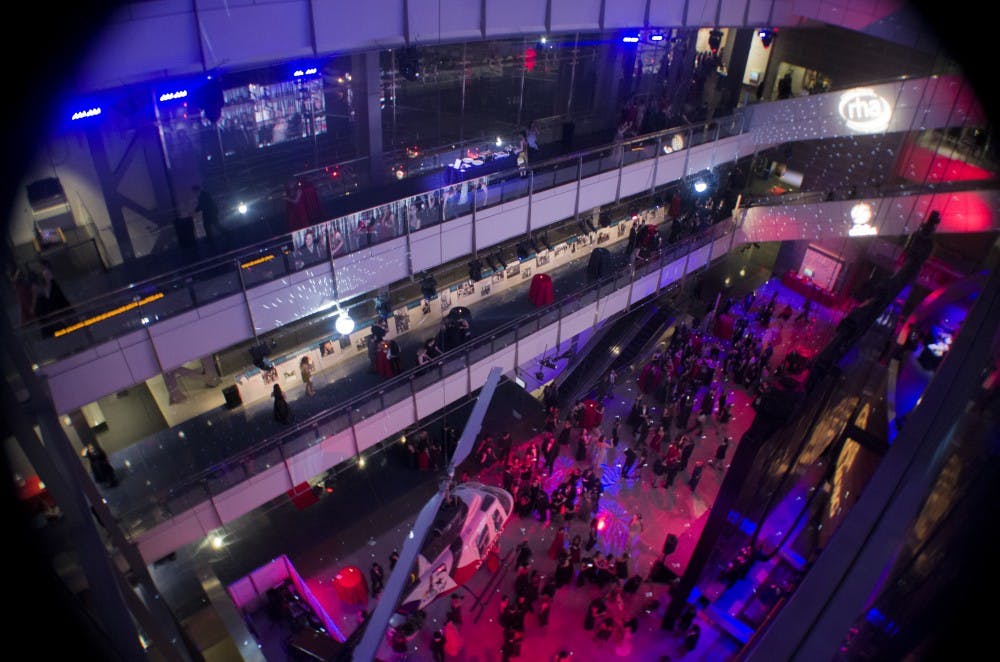This year’s Founders Day Ball celebration was held in late February at the National Air and Space Museum Steven F. Udvar-Hazy Center located in Chantilly, Virginia. The total cost of the event came to approximately $141,000 — a price on par with the growing cost of the ball each year.
The expansion of the event has led some students, including some within Student Government, to question if the event is an efficient use of student money. The Eagle believes that the inordinate growth of Founders Day Ball, without much input from students outside of Student Government on the direction of the event, has led to a slippery slope of unrealistic and unsustainable expectations.
Within the past 10 years, Founders Day Ball has expanded to grandiose venues across D.C. like the Newseum, National Portrait Gallery and National Museum of African-American History and Culture. It has done so all in the name of tradition and creating unity among students.
Hints of elitism surrounding the event stem from the social pressures and expectations for a night of extravagance and a certain quality of dress, which comes at an inaccessible price for many students. In the past, the ball was a ticketed event with tickets costing between $10 and $20. However, with concern for low-income students, the event was made free for all students. As well intentioned as this change was, it failed to account for the massive budgetary inconsistency created by removing the revenue stream.
While SG has implemented Clawed’s Wardrobe, a program offering free formal wear to students, as a means of being more inclusive, the initiative does not address the fundamental crux of the problem. What is the purpose that Founders Day Ball is intended to serve? Who is Founders Day Ball intended to serve? The most common answers to these questions revolve around tradition.
But, then the question remains: why is SG in charge of facilitating “tradition” at AU? Currently, SG takes $130,000 “off the top” of the total budget from the student activity fee to avoid having to ask or strong-arm Student Media Board and RHA for funds for the event as they had in the past. With a total Student Activities budget of about $950,000, Founders Day accounts for nearly 14 percent of the entire budget set aside for student activities.
One of the primary allures of AU for prospective and current students is the politically active nature of the campus community. It is the capacity for impact and community-building that small student organizations have which has historically been the foundation of fond memories and tradition, not a college prom with a bloated budget.
With the current budget structure of the event, students may not initially notice the impact that the cost of the event has upon their experience at AU. Even the new “off the top” method of funding Founders Day means that less money is allocated for the AU Club Council or Student Media Board (of which The Eagle is a member organization), which serve more students in a multitude of ways that SG and Founders Day cannot.
In addition, many of the former and current student staff across SG and RHA do not believe that the Founders Day Ball, in its current and projected state, is an efficient use of student money. SG’s expenditure of at least $130,000 of student money on the event demonstrates the sincere lack of responsible stewardship that SG has been criticized for in the past.
The Eagle urges both SG leaders and university administrators to rethink the mechanisms that are used to pay for the ball, and the unearned meaning that is often attached to it. Students themselves must care about the impact the event is having upon their own ability to run their organizations effectively, realizing that the idea of Founders Day Ball as historical tradition is without merit.
This doesn’t mean that the ball should be eliminated as an annual event, but it does mean that we should reconsider why so much of our “tradition” seems so tied up in a single, incredibly expensive night that is often defined by how many likes students’ Instagram posts earn. By rethinking what Founders Day means to us as a community, we might also find some answers about what our university experience does, and should, mean to us.
Clarification: This article has been edited from the original print story to clarify that the Student Activities budget is $950,000, not the Founders Day budget. The article has also been edited to reflect that The Eagle is a member organization of Student Media Board.
This article originally appeared in The Eagle's March 2019 print edition.




